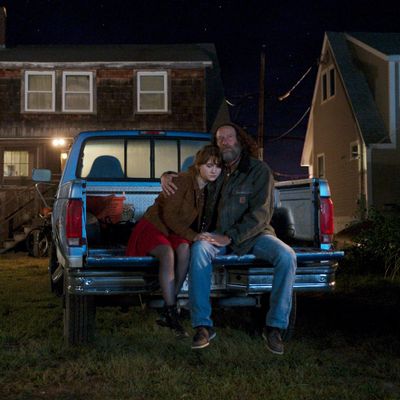
CODA has a premise of such concise indie melodrama that one of the characters sums it up around 20 minutes in, like an elevator pitch: “You’re the one with the Deaf family? Everyone but you? And you sing? Interesting.” Ruby Rossi (Emilia Jones) is the singer in question, a teenage CODA — child of Deaf adults — who’s spent her life acting as an interpreter for her parents, Frank (Troy Kotsur) and Jackie (Marlee Matlin), and to a lesser extent, her brother Leo (Daniel Durant), who’d rather communicate for himself. Ruby is ready for her voice to be heard, and after hearing that voice, her choir teacher Bernardo Villalobos (Eugenio Derbez) urges her to consider going out for Berklee College of Music. But she frets about her family needing her, and that they don’t understand this thing she loves more than anything in the world, except them.
CODA, an adaptation of the 2014 French film La Famille Bélier, was written and directed by Sian Heder, and it’s a tear-soaked dramedy that is absolutely corny at times. But it’s the kind of corny that leads to rapturous receptions at Sundance, where the film was a prize-winning hit that went on to be acquired by Apple TV+ for a record-breaking $25 million. While a little sentimentality never hurt anyone, what stands out when revisiting CODA outside the festival bubble are the parts that feel unguided by formula, all of which have to do with the dynamics of the Rossi family. Ruby’s journey is familiar from a dozen teen movies. She has the encouragement of a quirky mentor, and starts a romance with a noodle of a duet partner named Miles (Ferdia Walsh-Peelo from Sing Street), and comes into her own just in time for her big audition. But the dynamics inside her family’s household, and their fishing business, are far less predictable, and they figure into a whole spectrum of feelings regarding being in a world run by the hearing.
Frank sees his reliance on Ruby as a practical matter — he’s a third-generation fisherman, and assumes that, like her brother, she’ll follow in his footsteps while continuing to play point person when it comes to interfacing with buyers and the increasingly complicated regulations the industry is being subjected to. Jackie, meanwhile, feels little need to interact with the world outside the Rossi home, and her dependence on Ruby to mediate everything is also a way to keep her daughter close. Leo, on the other hand, feels infantilized by the way Ruby always steps in. “You’re so afraid that we’d look stupid. Let them figure out how to talk to Deaf people,” he angrily retorts to her at one point. And he’s not wrong — part of her own trepidations at school come from how she was mocked as a kid because she’d learned to talk with the intonations of deaf speech.
Ruby’s not ashamed of her family, but she’s far more afraid of them being laughed at than they themselves are. Her parents, in particular, are very unapologetically themselves, blasting rap from their car when they pick her up from school because Frank likes to feel the bass, and getting audibly frisky while Ruby has a friend over, to her intense mortification, because they didn’t know she was home. The Rossis may be in the minority when they’re out in the Cape Ann community in which they live and work, but their home is a Deaf one that Heder takes pains not to dilute for viewers, with the conversations happening entirely in ASL. One of the difficult emotions CODA teases out involves Ruby feeling like an outsider in her own home, lacking a core bit of common ground that the other members of her family share, while having other interests they can’t connect with. She keeps a record player in her room, and bemoans to her best friend, Gertie (Amy Forsyth), that her mother thought it was a waste of money.
Her mother won’t ever understand the pull music has for her daughter, but at the heart of CODA is the gradual understanding that that doesn’t matter, and that you can love someone without being able to understand everything they love themselves. At a key moment in the film, during Ruby’s school concert, the sound drops out, and we experience the event as her parents are — smiling, and clapping along when others do, and looking over the faces of their fellow audience members for a sense of their reactions. After the concert, Frank asks Ruby to sing for him, and places his hands on her throat to feel the vibrations of her vocal cords as she belts out verses from “You’re All I Need to Get By.” It’s a total knockout of a scene — heart-stoppingly earnest and so alive that any potentially manipulative aspects are swept away. There’s only Kotsur’s face, intent with such tenderness and concentration as he tries to bridge the gap between Frank and his daughter, as though trying to find a direct channel to her heart.
More Movie Reviews
- The Accountant 2 Can Not Be Taken Seriously
- Another Simple Favor Is So Fun, Until It Gets So Dumb
- Errol Morris Has Been Sucked Into the Gaping Maw of True Crime


